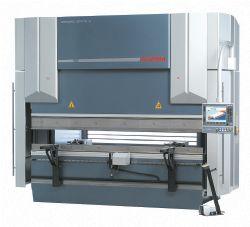THE amazing success and growth of Durma lies in listening to what customers require and providing quality solutions at the best price. Renowned for being among the heaviest machines in their class Durma keeps their prices competitive by using automation and modern production line techniques to reduce overheads. With several in-ground machining centres of 10 metres-plus machining length, the press brake and guillotine frames are processed in one operation ensuring perfect alignment and minimum handling. Frames then move throughout the gigantic factory and paint shop on large trolley carts onto the final assembly bay. Here tooling and controllers are fitted, mainly Delem or Cybelec for press brakes or Siemens for the laser cutters and turret punches. Two new models have been included in the range; the AD-S advanced, high speed CNC Synchro press brake with multi axis back gauge and the no throat, swing beam guillotine which still offers the deepest frame and lowest blade rake angle to reduce the curl of the off cut. Durma also offers complete turnkey solutions including robot materials handling, fully featured turret presses with gantry loading and laser and plasma cutters. While high speed, high accuracy machines are becoming more popular, there is still a large market for Durma’s traditional machines such as V notchers (both variable and fixed angle), iron-workers (45 ton to 165 ton) and a host of electro-mechanical sheet-metal working machines. Durma is the one stop shop for all steel folding and cutting requirements. The bi-annual trip to the factory is in September 2008, with four available places for those who wish to see for themselves. Contact kevin@leabourn-rose.co.nz or phone (09) 274 6186.
Durma: Harmony of strength and hi-tech
General
Wednesday, 06 August 2008






